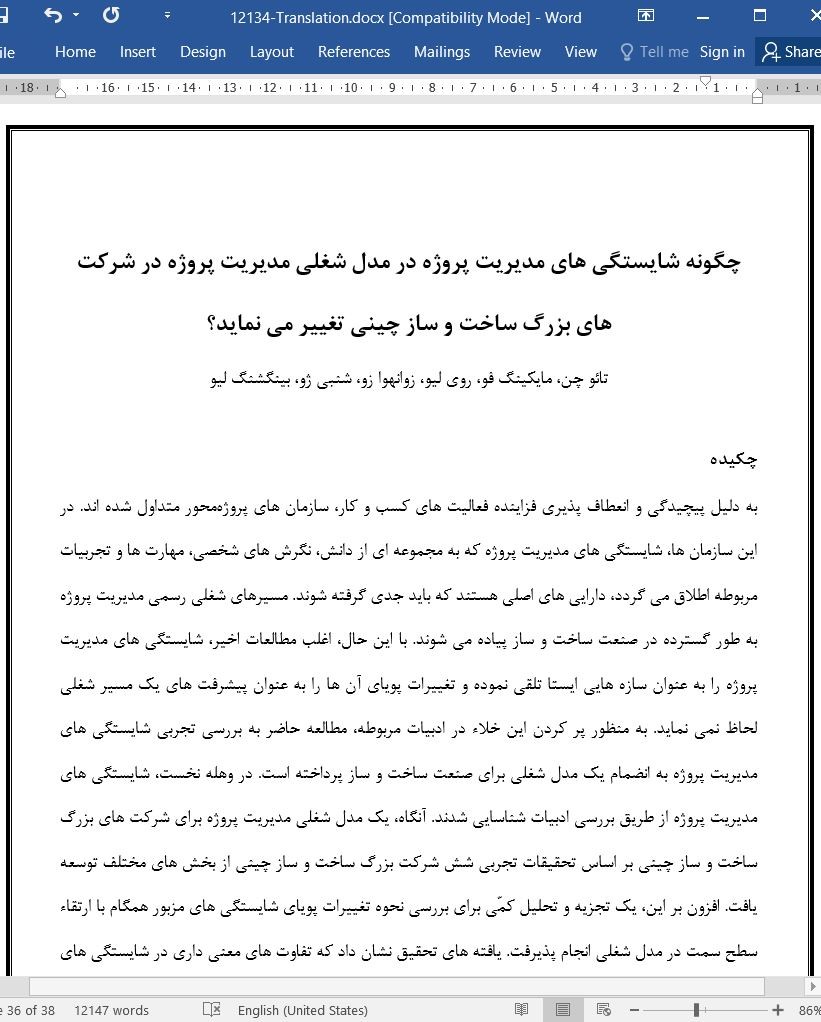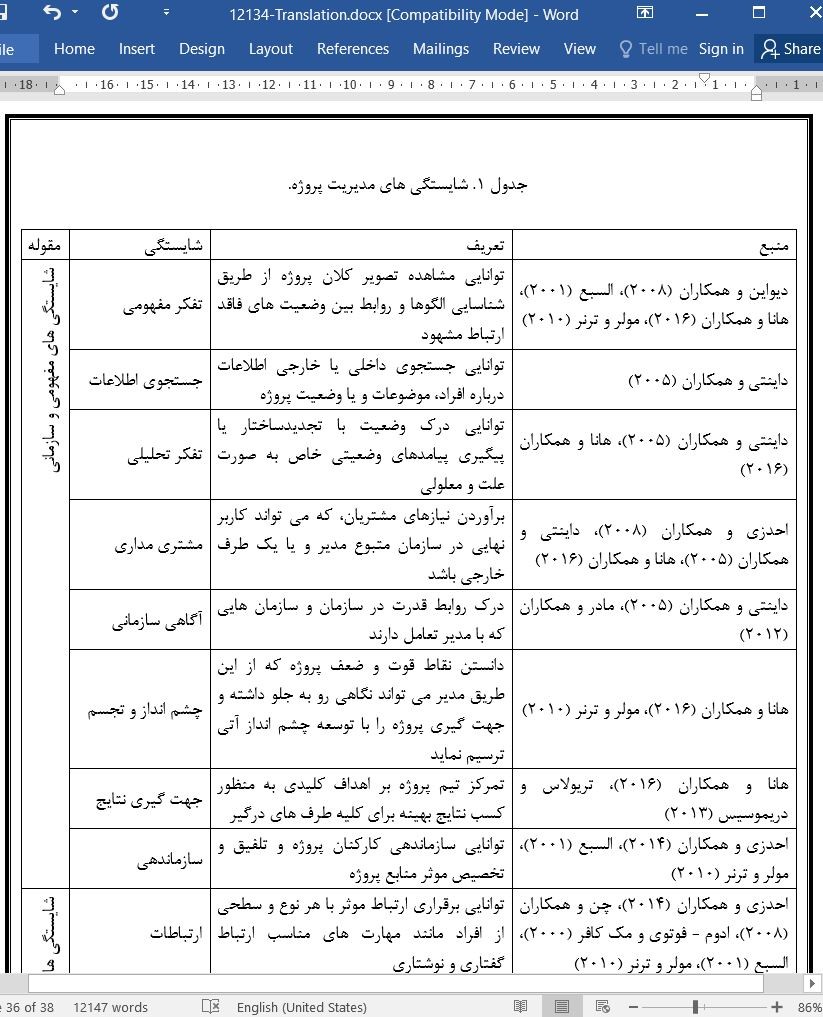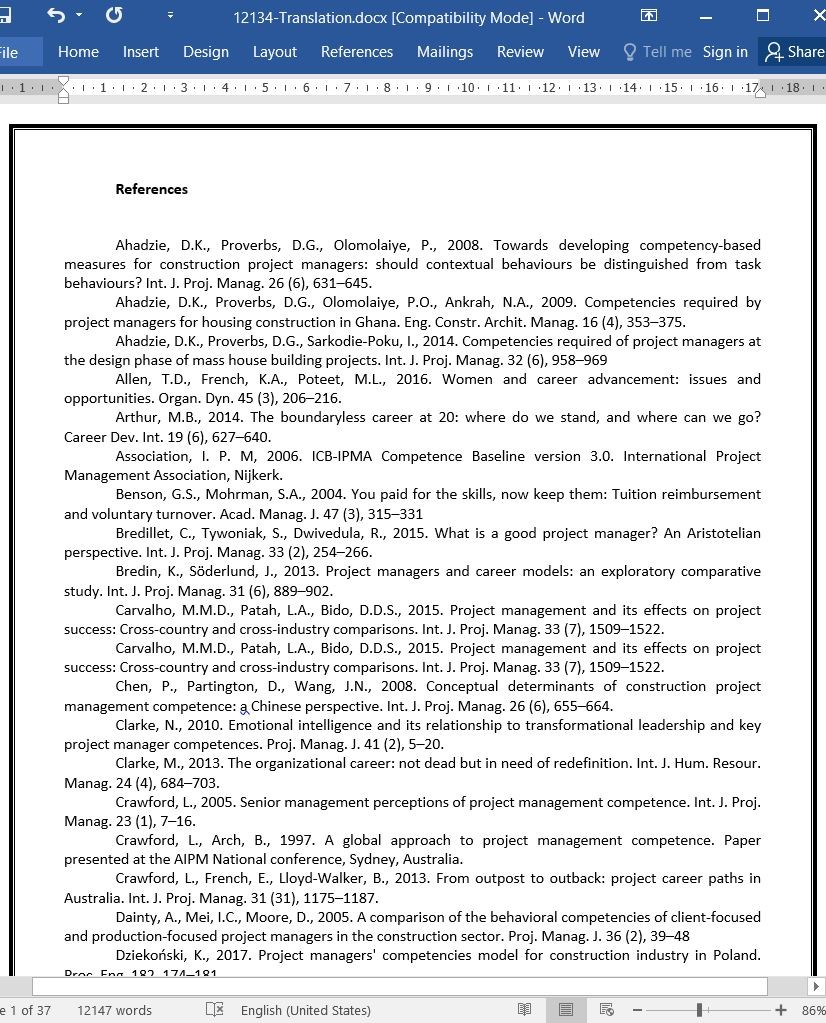
چگونه شایستگی های مدیریت پروژه در مدل شغلی مدیریت پروژه تغییر می نماید؟
چکیده
به دلیل پیچیدگی و انعطاف پذیری فزاینده فعالیت های کسب و کار، سازمان های پروژهمحور متداول شده اند. در این سازمان ها، شایستگی های مدیریت پروژه که به مجموعه ای از دانش، نگرش های شخصی، مهارت ها و تجربیات مربوطه اطلاق می گردد، دارایی های اصلی هستند که باید جدی گرفته شوند. مسیرهای شغلی رسمی مدیریت پروژه به طور گسترده در صنعت ساخت و ساز پیاده می شوند. با این حال، اغلب مطالعات اخیر، شایستگی های مدیریت پروژه را به عنوان سازه هایی ایستا تلقی نموده و تغییرات پویای آن ها را به عنوان پیشرفت های یک مسیر شغلی لحاظ نمی نماید. به منظور پر کردن این خلاء در ادبیات مربوطه، مطالعه حاضر به بررسی تجربی شایستگی های مدیریت پروژه به انضمام یک مدل شغلی برای صنعت ساخت و ساز پرداخته است. در وهله نخست، شایستگی های مدیریت پروژه از طریق بررسی ادبیات شناسایی شدند. آنگاه، یک مدل شغلی مدیریت پروژه برای شرکت های بزرگ ساخت و ساز چینی بر اساس تحقیقات تجربی شش شرکت بزرگ ساخت و ساز چینی از بخش های مختلف توسعه یافت. افزون بر این، یک تجزیه و تحلیل کمّی برای بررسی نحوه تغییرات پویای شایستگی های مزبور همگام با ارتقاء سطح سمت در مدل شغلی انجام پذیرفت. یافته های تحقیق نشان داد که تفاوت های معنی داری در شایستگی های مدیریت پروژه موجود در سطوح مختلف مدل شغلی وجود دارد. با این حال، توزیع مربوطه در سطوح مختلف مدیریت پروژه برای شایستگی های مفهومی و سازمانی، شایستگی های انسانی، و شایستگی های فنی، ثابت می ماند.
7.3. محدودیت ها و تحقیقات آتی
برخی از محدودیت های مطالعه حاضر اجتناب ناپذیر هستند. نخست، این مطالعه با تلفیق یک مدل شغلی در پی بسط مدل عمومی برای شایستگی مدیریت پروژه است. بنابراین، مطالعه حاضر صرفاً به بررسی شایستگی های عمومی مدیریت پروژه در هر جایگاهی می پردازد و نه مهارت ها و یا دانش دقیق. افزون بر این، صفات شخصی به عنوان شایستگی در این مطالعه لحاظ نشده زیرا مطالعه حاضر صرفاً بر مهارت ها یا دانشی تمرکز دارد که از طریق یادگیری یا تمرین بهبود می یابند. مطالعات آتی می توانند مدل شایستگی مدیریت پروژه را با بررسی شایستگی های خاص لازم در هر سطح و لحاظ صفات شخصی غنی نمایند.
Abstract
Due to the increasing complexity and flexibility of business activities, project-based organizations have become common. In such organizations, project management competencies, which refer to a collection of knowledge, personal attitudes, skills, and relevant experience, are core assets that must be taken seriously. Formalized project management career paths have been widely implemented in the construction industry. However, most recent studies treat project management competencies as static constructs and fail to consider their dynamic changes as a career path advances. To fill this gap in the literature, this study conducted an empirical examination of project management competencies integrated with a career model for the construction industry. First, key project management competencies are identified through a literature review. Then, a project management career model for large Chinese construction companies is developed based on an empirical investigation of six large Chinese construction companies from various sectors. Moreover, a quantitative analysis is performed to explore how these competencies dynamically change as position levels rise in the career model. The research findings indicate that significant differences in project management competencies exist at different levels of the career model. However, the distribution remains steady at different project management position levels for conceptual and organizational competencies, human competencies, and technical competencies.
7.3. Limitations and future research
Some limitations are inevitable in this study. First, this study aims to extend a general project management competency model by integrating a career model. Therefore, this study only investigates generalized competencies for project management rather than detailed skills or knowledge at each position level. In addition, personal traits are not included as competencies in this study because this study only focuses on the skills or knowledge that can be improved through learning or practice. Future studies could enrich the project management competency model by investigating the specific competencies required at each level and including personal traits.
چکیده
1. مقدمه
2. نقاط شروع
2.1. شغل، مسیر شغلی و مدل شغلی
2.2. مسیر شغلی جدید برای مدیریت پروژه
2.3. شایستگی های مدیریت پروژه
3. روش شناسی
4. مدل های شغلی مدیریت پروژه در شرکت های بزرگ ساخت و ساز چینی
4.1. بررسی مدل های شغلی مدیریت پروژه در شرکت های بزرگ ساخت و ساز چینی
4.2. مدل های شغلی مدیریت پروژه در شرکت های ساخت و ساز چینی مورد مطالعه
5. تغییرات شایستگی در مدل شغلی مدیریت پروژه
5.1. نمونه برداری
5.2. ابزار نظرسنجی
5.3. گردآوری داده ها
5.4. تجزیه و تحلیل داده ها
6. بحث
7. نتیجه گیری و تحقیقات آتی
7.1. پیامدهای نظری
7.2. پیامدهای مدیریتی
7.3. محدودیت ها و تحقیقات آتی
منابع
Abstract
1. Introduction
2. Points of departure
2.1. Career, career path and career model
2.2. A new career path for project management
2.3. Project management competencies
3. Methodology
4. Project management career models in large Chinese construction companies
4.1. Investigation of project management career models in large Chinese construction companies
4.2. The project management career models in the investigated Chinese construction companies
5. Changes of competencies within the project management career model
5.1. Sampling
5.2. Survey instrument
5.3. Data collection
5.4. Data analysis
6. Discussion
7. Conclusions and future research
7.1. Theoretical implications
7.2. Managerial implications
7.3. Limitations and future research
References
- اصل مقاله انگلیسی با فرمت ورد (word) با قابلیت ویرایش
- ترجمه فارسی مقاله با فرمت ورد (word) با قابلیت ویرایش، بدون آرم سایت ای ترجمه
- ترجمه فارسی مقاله با فرمت pdf، بدون آرم سایت ای ترجمه



